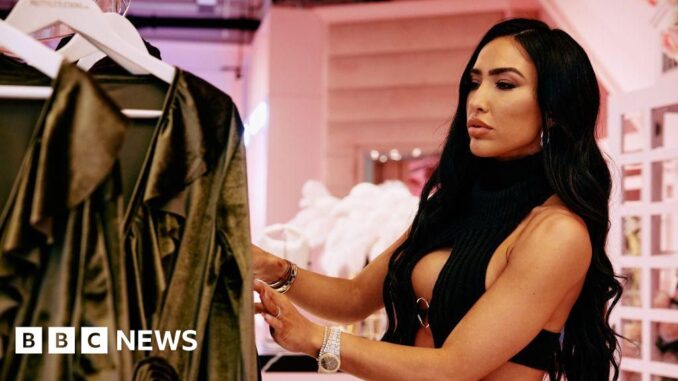
Fast-fashion brand PrettyLittleThing (PLT) is facing criticism from customers who have had their accounts with the company deactivated because of the number of times they have returned their purchases.
In an email seen by the BBC, shoppers were told on Friday that their accounts had been reviewed and shut down so they would not be able to place any further orders.
Some of those affected have used social media to criticise the new policy, claiming they had only made one return so far this year, or suggesting they would return fewer items if the firm was more consistent in its sizing of clothing items.
PLT did not immediately respond to the BBC’s request for comment.
The online retailer, which is part of the Boohoo Group, had come under fire earlier this month after scrapping its free returns policy.
One PLT customer branded the latest move a “joke” and said returns would not be necessary if the sizing and the quality of the clothing was not “awful”.
Posting on X, they said: “You don’t have a physical store, [of course] people will return things.”
Another wrote that they had received the email telling them their account was being deactivated despite the fact their last return to the company was three months ago.
On TikTok, videos of shoppers questioning why their accounts have been suspended have also received hundreds of likes.
It was not immediately clear what criteria the company used for its decisions.
Becca Unsworth, a 24-year-old pensions administrator from Preston, told the BBC that she was “appalled” after her account was suspended.
Initially, she was not sure whether the email had been sent to her in error.
However, on Saturday morning she says she was informed by a PLT customer service adviser that it was genuine.
She describes herself as a loyal customer for the last seven years: “I go to PLT for everything really – something for work, a new top for a night out, hair stuff, beauty products. I spent so much money there.
“I do return but it’s due to the fact something may arrive faulty or I need to order an item in three different sizes to make sure it fits at all,” she said, describing the brand’s sizing as “terrible”.
Becca had also paid the £9.99 fee to access PLT’s “Royalty” scheme for unlimited deliveries in the UK for a year.
But she has been told with her account being deactivated, the company will not provide her with a refund or partial refund.
She adds that the experience has “put [her] off shopping there ever again” and now she will opt for the likes of Asos or Shein.
Sophie Smith, a 26-year-old PLT shopper from Norwich, said that she thought the message received was a “joke” initially.
She has been a member of its “Royalty” delivery scheme since it was first offered and opts for PLT for outfits for bottomless brunches, weddings or nights out.
She told the BBC she has only made one return to PLT this year, and added that she felt the latest development showed the company “doesn’t value their customers”.
In the email, PLT apologised for any inconvenience caused and pointed out that shoppers would still be able to make returns via its online portal.
PLT is part of the Boohoo Group, which was founded by Mahmud Kamani and retail executive Carol Kane in 2006.
The brand started out as an accessories-only outfit, with a focus on on-trend, low-cost pieces.
It was co-founded and headed up by Umar Kamani, one of Mahmud Kamani’s sons, who drove the brand’s collaborations with the likes of supermodel Naomi Campbell and influencer Molly-May Hague, as well as its expansion in the US.
While it has come under the spotlight for its working practices, the Boohoo Group was one of the big winners of the pandemic, as online retailers thrived.
However, it has since faced several challenges with the rate of returns normalising, rising competition from ultra-fast fashion brands like Shein, and customer budgets being squeezed during the cost-of-living crisis.
Customers vented their frustration recently when PLT decided to introduce a £1.99 fee for returns, including for those members of its “Royalty” service.
High Street giants such as Zara, Uniqlo and Next already charge for online returns, while PLT rival OhPolly recently introduced a policy where the greater the amount of an order returned, the higher the return fee.
Instead of a flat fee, shoppers now face an £8.99 return fee for returning every item they order, versus £2.99 for less than half of the items, for example.
Analysts have said, however, that retailers are facing cost pressures themselves, which mean they need to introduce these charges or put prices up.
For fashion retailers, covering the cost of returns can be expensive and they have to consider the environmental impact of using delivery trucks for this purpose too.
More have been opting to shift costs on to customers as a result, as well as clamping down on returns by introducing stricter inspections to spot when clothes have been worn for an occasion and sent back after one use.


Be the first to comment